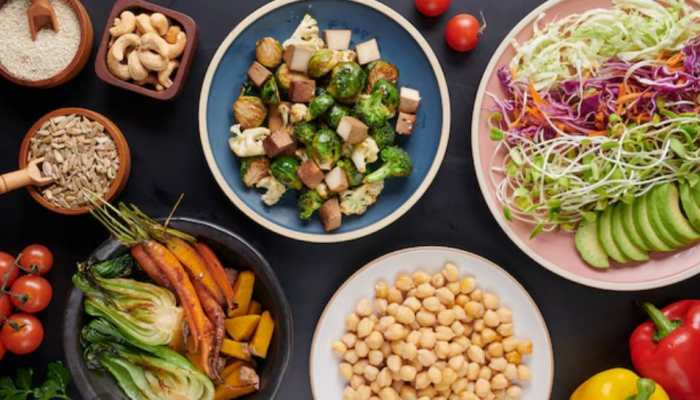Navigating Daily Challenges As A Vegan: Common Hurdles And Tips For Success
While veganism comes with its set of challenges, these obstacles are manageable with preparation, education, and creativity. As more people embrace plant-based lifestyles, the availability of vegan products and understanding within society continue to grow.
Trending Photos
) Image credit: Freepik
Image credit: Freepik Being vegan is more than just a dietary preference; it's a lifestyle choice that often stems from ethical, environmental, or health motivations. However, despite its growing popularity, vegans frequently face challenges in their daily routines. From social situations to nutritional concerns, here are some common hurdles vegans encounter and strategies to handle them effectively.
1. Limited Food Options in Restaurants and Social Gatherings
Challenge: One of the most common issues vegans face is finding plant-based food options when dining out or attending social gatherings. While many restaurants now offer vegan dishes, the choices can still be limited, especially in smaller towns or less progressive areas. At social events like parties or family dinners, vegan-friendly options might be non-existent.
Solution: Researching restaurant menus in advance can help identify vegan-friendly options. Calling ahead to check for accommodations or choosing restaurants known for their diverse menus can make dining out less stressful. For social gatherings, bringing a vegan dish to share not only ensures there is something to eat but can also introduce others to plant-based foods.
2. Misunderstanding and Social Pressure
Challenge: Vegans often face questions, stereotypes, or outright criticism from others who may not understand or agree with their choices. Social pressure can range from well-meaning but intrusive questions ("Where do you get your protein?") to more judgmental comments.
Solution: Having a few simple, confident responses prepared can help address questions without getting into debates. For example, when asked about protein sources, mentioning foods like lentils, chickpeas, tofu, and quinoa can be a quick answer. Emphasizing that personal choices are rooted in health, sustainability, or compassion can also shift conversations to a more positive note.
3. Hidden Animal Ingredients
Challenge: Many products, even those that seem plant-based at first glance, can contain hidden animal-derived ingredients. Foods like bread, wine, or certain snacks may include additives like gelatin, casein, or carmine.
Solution: Reading labels and becoming familiar with common non-vegan ingredients is key. Apps and online resources can help identify which products are vegan-friendly. Additionally, reaching out to brands or checking their websites can provide more clarity about certain items.
4. Nutritional Balance
Challenge: Ensuring a well-balanced vegan diet that meets all nutritional needs can be challenging, especially when starting out. Key nutrients that may require extra attention include vitamin B12, iron, omega-3 fatty acids, calcium, and protein.
Solution: A varied diet that includes legumes, grains, vegetables, fruits, nuts, and seeds usually provides most necessary nutrients. However, vitamin B12 should be taken as a supplement, as it is primarily found in animal products. Foods fortified with calcium and omega-3s, such as plant-based milks and flaxseeds, can help maintain health. Consulting a dietitian or nutritionist can be invaluable for new vegans who are navigating this transition.
5. Convenience and Meal Prep
Challenge: Preparing balanced, plant-based meals can sometimes be more time-consuming compared to conventional eating habits. This can lead to convenience-related struggles, especially for those with busy lifestyles.
Solution: Batch cooking and meal prepping can save time and make maintaining a vegan diet easier. Preparing dishes in advance and storing them in portioned containers allows for quick meals throughout the week. There are also increasingly more pre-packaged vegan snacks and ready-to-eat meals available in stores, making it simpler to grab something on the go.
6. Affordability Concerns
Challenge: A misconception about veganism is that it is expensive due to specialty products like plant-based cheeses or meat substitutes. While it’s true that these items can be pricier, they are not necessary for a nutritious vegan diet.
Solution: Staple items such as beans, lentils, rice, potatoes, vegetables, and fruits are cost-effective and nutritious. Incorporating whole foods and minimizing processed products can make veganism more affordable. Shopping at local markets and buying in bulk can further reduce expenses.
7. Cultural and Family Expectations
Challenge: Food is an integral part of cultural and family traditions, which can make being vegan difficult when attending gatherings where traditional dishes are prepared. This can create feelings of exclusion or guilt.
Solution: Finding or creating vegan versions of beloved cultural recipes can bridge this gap. For instance, dairy-free milk, tofu, and plant-based oils can often replace traditional ingredients in many recipes without compromising on taste. Bringing a vegan dish to share at gatherings allows for participation while adhering to personal choices.
By navigating these common hurdles thoughtfully, individuals can maintain a balanced vegan diet and enjoy the benefits of this compassionate and health-conscious lifestyle.
(This article is intended for your general information only. Zee News does not vouch for its accuracy or reliability.)
Stay informed on all the latest news, real-time breaking news updates, and follow all the important headlines in india news and world News on Zee News.
Live Tv







)
)
)
)
)
)
)
)
)
)
